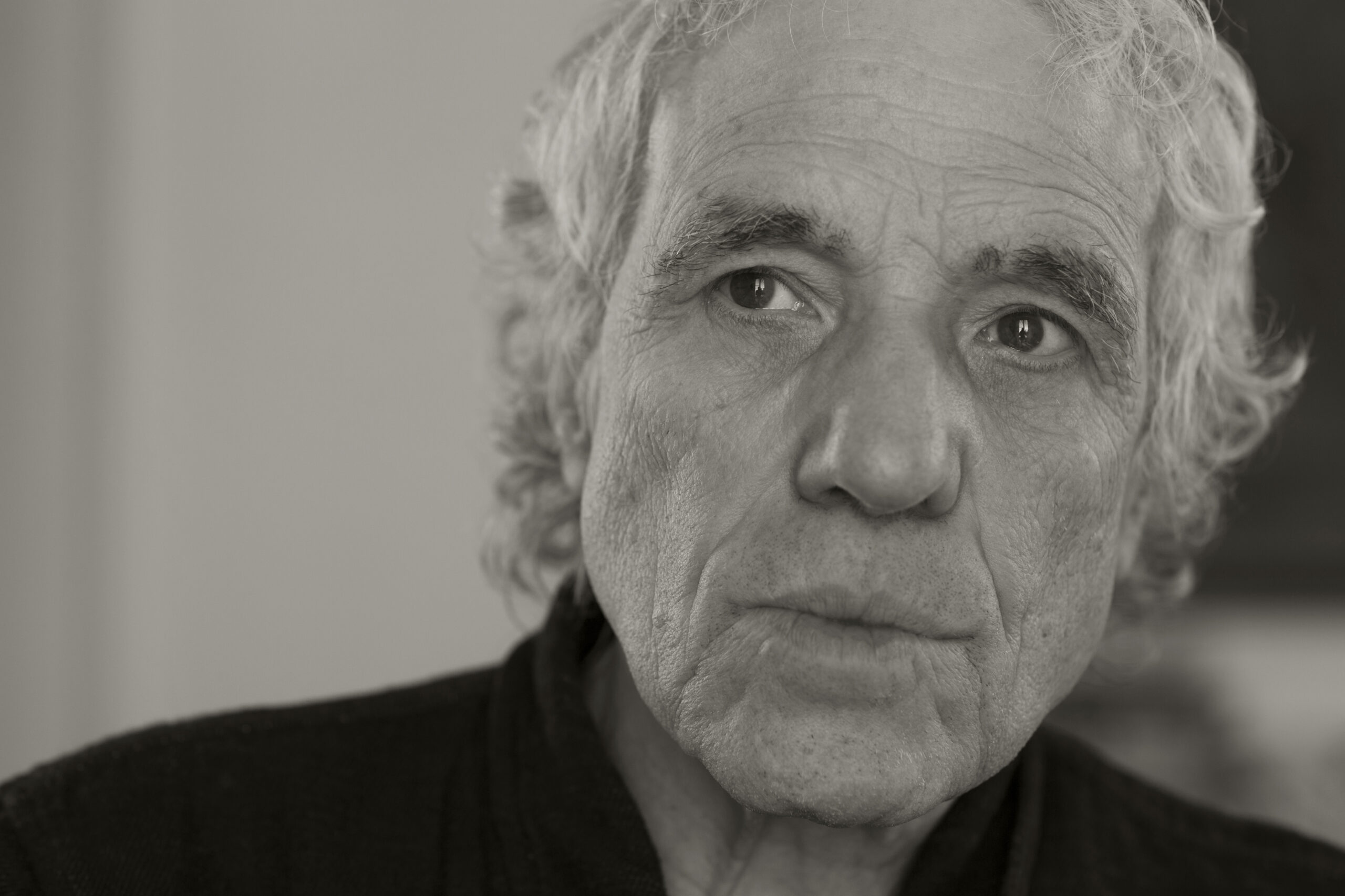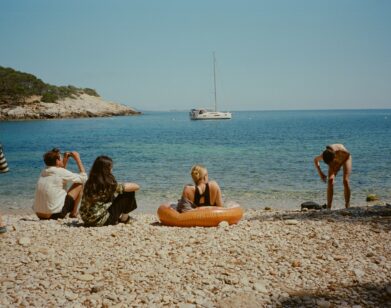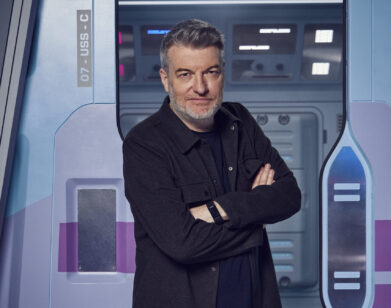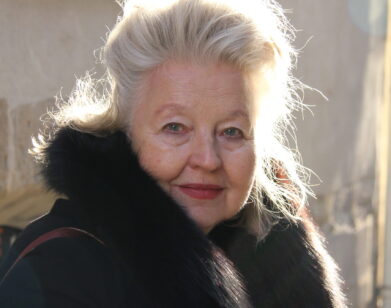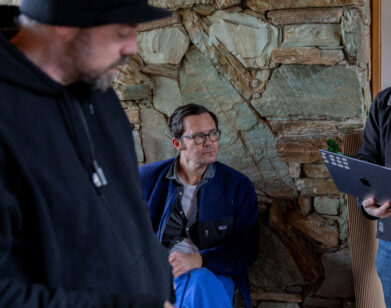DIRECTOR
Director Abel Ferrara Doesn’t Want to Take Part in Your Q&A
The last time I talked to Abel Ferrara, relaxing in a tennis club next to the Excelsior hotel in Venice, he spoke about a documentary he’d started on Patti Smith: “It’s like the Ukraine thing,” Ferrara explained in his irresistible Bronx growl. “We’re shootin’, where it’s going, who knows?” Born in 1971, Ferrara has always been a creature of instinct. Early in his career, he honed his tough, gritty style in porn and exploitation before going on a run of era-defining films in the ‘80s and ‘90s that included Bad Lieutenant and The King of New York. Today, Ferrara remains hugely influential to the city’s thriving independent scene despite moving to Rome almost twenty years ago. That journey coincided with a newfound sobriety, his second marriage (to Moldovian actress Cristina Chiriac), and a more inward-looking style.
The “Ukraine thing” and the Patti Smith doc has since become Turn in The Wound, a documentary that premiered last month at Berlinale that interweaves footage of Smith’s recent performances in the Centre Pompidou with interviews the director conducted in Ukraine and contributed footage of the conflict. It’s expressionistic, indelicate, utterly sincere—no one else could have made it. On the morning of the premiere, Alexis Navalny was announced dead. At the Q&A afterwards, Ferrara appeared visibly agitated. We met a few days later in a Spartan backroom of the Hyatt hotel, the white linens of Venice now a simple black suit—he appeared compact, angular, ready for a fight. Given Chiriac’s lineage, I was curious if he felt he had some skin in the game. “That was part of the whole thing, because I’ve been living in that feeling,” he explained. “I’ve got friends that are Ukrainian. And I feel like, ‘Hey, I’m Buddhist.’ So we’re all one to begin with.” In a wide-ranging conversation, we talked about meeting Volodymyr Zelensky, the redundant nature of audience Q&As, and where he’s at with his next project, American Nails.
———
ABEL FERRARA: Hey, man.
RORY O’CONNOR: Nice to meet you.
FERRARA: Nice to meet you.
O’CONNOR: How are you doing?
FERRARA: Good.
O’CONNOR: It’s cold out. So I was at the screening on Friday.
FERRARA: Oh, great.
O’CONNOR: I remember earlier that day, I came out of a screening here in the Potsdamer Platz area. There were three or four helicopters in the sky. I took out my phone thinking something terrible had happened, and then got the news. Boom, Navalny’s dead. We’re living in this world where we’re just bombarded with all this stuff, now more than ever in my life. A film like yours that responds with something expressionistic and poetic is one of the only ways that you can respond to it. I found it very powerful.
FERRARA: Well, thank you. Where are you from?
O’CONNOR: I’m from Ireland.
FERRARA: Where, though?
O’CONNOR: Dublin.
FERRARA: Oh, great. I’ve got a lot of friends there. I’m half-Irish.
O’CONNOR: Oh, yeah?
FERRARA: My mother’s maiden name is O’Brien.
O’CONNOR: What part of Ireland?
FERRARA: County Clare.
O’CONNOR: Nice part of Ireland. Nice part of the world. I know you don’t like talking about intentions, but was this something that was on your mind, to just do something to show your response to what’s going on?
FERRARA: Yeah, that’s why I went there in the first place. It’s not so much a response. It’s just to fucking get the info, get the intel, find out what’s really happening. Again, you’re bombarded with shit. You’re in a world where you can’t even trust your own eyes. Sometimes you’ve got to go back to reality. It’s simple, just looking and talking to people.
O’CONNOR: We spoke really briefly in Venice a couple of years ago, for Padre Pio. At that time, you spoke about the Ukraine and Patti Smith films you were working on. Obviously, since then, they’ve come together.
FERRARA: Yeah, they came together.
O’CONNOR: Was there a moment when that happened or was it more organic?
FERRARA: It’s like a process. You’re working on something, you’re working on the other. Then they start talking to each other and the next minute, it becomes one film. I’m open for whatever’s going to make the experience count. I’m not locked into any reality. I’m shooting something. We’re shooting a lot of things.
O’CONNOR: When you told Patti that the two were going to become one–
FERRARA: Me and Patti, we didn’t discuss it.
O’CONNOR: Yeah?
FERRARA: She knows I’m a final cut director. You know what I mean? We’re filming her performance. She’s an artist, if she’s anything.
O’CONNOR: Do you guys go back a long way?
FERRARA: No. I mean, I know all about her, but I just met her about a couple of years ago and I asked her if she’d be up for us filming her. We didn’t even approach it like, “We’re making a documentary about you.” We just filmed some concerts. Stefan, he works with us and brings a lot to our movie sound-wise sometimes and kind of fills in the gaps. He introduced me to her and they were doing this project, the poetry stuff, with this kind of crazy music. And then they did that show with the images on top of the music. We filmed that.
O’CONNOR: With Sean Price Williams shooting on both projects?
FERRARA: Sean was shooting in Ukraine.
O’CONNOR: How did he find it over there?
FERRARA: How did he like it over there? He likes shooting. He likes working. I wasn’t going to take him because he’s a little too young. The first time we went, I didn’t know how dangerous it was going to be.
O’CONNOR: Was there any moment where you felt a bit dicey?
FERRARA: No, not really. You don’t hear the bullet that kills you. They’re flying drones in there. They’re keeping everybody on their toes. You know what I mean? But it’s not the war zone.
O’CONNOR: You spoke in the Q & A about wanting to go there “humbly.” You wanted to take your camera there.
FERRARA: It’s how I always shoot. I’m not forcing an issue. I’m in the game. Come to me. I don’t have an agenda. I didn’t have expectations on the set. Nevermind when the film was out. It belongs to everybody now. I’m not force-feeding anybody. I’m not looking to be teaching anybody anything at all. I’m teaching myself. I’m learning. I’m experiencing life. And this is how I share that with you. “Take it or fucking leave it” was my attitude.
O’CONNOR: How did you find the subjects for the interviews? What was your process?
FERRARA: We’re there, we’re rolling. We talked to a lot more people than are in the movie. They bring us people that they know, and then people who have a desire to speak move up to the front. But those kids sitting in the park, they all didn’t know what the fuck was going on. You know what I’m saying?
O’CONNOR: Yeah.
FERRARA: But casting a movie, deciding who’s going to be in front of the camera, that’s one of my special gifts.
O’CONNOR: How did you organiZe the Zelensky chat?
FERRARA: He’s in the business. I didn’t just go there. I talked to the Vice President and [Andriy] Yarmak,, they were all in the movie business. I just threw it out there. “What do you think if we came and started shooting?” They said, “Great.” And they helped us get there and put us up and fed us. It was important to them that we did this. We didn’t just parachute in out of the sky.
O’CONNOR: He gives a great interview. He’s very philosophical.
FERRARA: Do you like Zelensky?
O’CONNOR: I liked the way he talked in the film. What was your impression of him?
FERRARA: Just like in the movie, he seems like a straight-up guy. I take everybody at face value. I’m not looking to see if this guy is conspiratoring me, if that’s even a word. I ain’t looking for the hustle. I ain’t looking for whatever. I hear what the guy’s got to say. He got thrown into his fucking thing. First day in office was the fucking pandemic and a lot of people died there because that’s a place where it ain’t the United States. Like, “Oh, we need 30 billion masks. We’re not going to have them for two months. Oh my god.” No. It’s like, “We got no masks and we ain’t getting no fucking masks, and we ain’t getting no fucking vaccine, and we ain’t getting no rubber gloves.” Okay? Because we’re in the fucking middle of fucking nowhere. Those people ain’t looking for them. You dig what I’m saying?
O’CONNOR: For sure.
FERRARA: At the same time, they manned up quick and they’ve been fighting for two years.
O’CONNOR: That’s wild.
FERRARA: I don’t know how they‘re doin now. It doesn’t sound like it’s going too well now. Have you ever been there?
O’CONNOR: I haven’t, no. Have you been to Russia?
FERRARA: Russia’s awesome. I mean, this is the whole disaster with that.
O’CONNOR: For sure.
FERRARA: This is a disaster. Russia is awesome. St. Petersburg’s awesome. People in Russia are awesome. And now everybody’s killing each other.
O’CONNOR: Yeah.
FERRARA: The mother of my daughter is from Moldova, which is basically the USSR. I don’t get it. Now what? They’re the enemy? He’s the enemy. They ain’t the enemy.
O’CONNOR: So your wife being from Moldova, did you kind of feel like you had a bit of skin in the game there?
FERRARA: Sure, yeah. That was part of the whole thing, because I’ve been living in that feeling and I’ve got friends that are Ukrainian. And I feel like, “Hey, I’m Buddhist. So we’re all one to begin with.” And second of all, I’m in Europe, and that’s part of Europe, man. Even Russia is part of Europe. That’s part of the country I’m living in now. I live in Italy, but I live in Ireland too and I live in Russia. I go to Dublin. I go to St. Petersburg. That’s the beauty of living in Rome. It’s better than going to Cincinnati. I mean, I don’t want to rubbish Cincinnati.
O’CONNOR: At the end of the film, you had this dedication to your old cinematographer, Ken Kelsch.
FERRARA: Yes, a nightmare.
O’CONNOR: And that was just recently as well. Sorry for your loss.
FERRARA: No, it’s terrible. It was like right before Christmas. He was 77. He was sick. These guys that fought there, both sides, Vietnam too. These guys that fought there, in that war, then the cancer comes down fucking forty years later.
O’CONNOR: Yeah.
FERRARA: It’s not overnight, man. But they’re all getting the same cancer, kidney cancer. He had it for three, four years, fighting. And had Covid. This guy was a brilliant guy, man. He was always into photography. He went to NYU film school.
O’CONNOR: Oh, yeah?
FERRARA: That’s where I met him.
O’CONNOR: And you made Driller Killer together?
FERRARA: We shot that with him in ’78.
O’CONNOR: Any stories from that shoot?
FERRARA: Shit. [It was] a thousand years ago.
O’CONNOR: I’m sure. And Bad Lieutenant too also, right?
FERRARA: Yeah. Then we had a kind of falling out. I didn’t see him for a while. I did my thing. He was doing his thing. Then we came back together. Then we did Bad Lieutenant, Dangerous Game, The Addiction, The Funeral.
O’CONNOR: You had a nice line about him in the Q&A, that he was “tiptoeing through the raindrops.” Are you a fan of Q&A’s at festivals?
FERRARA: It’s like pulling teeth, you know what I mean? There’s 800 fucking people. Nobody stands up and fucking starts talking. 800 intimidated people? Did you know the woman who was sitting next to my producer, Peter, at the dinner? On his left? She started with, “What did you want the audience to take away? What message do I want to deliver?”
O’CONNOR: Yeah.
FERRARA: It’s the way people look at films. It’s a fascist way of looking at films. They think Adolf is going to show up and give all the commands and then, at the end, I’m going to hand out a multiple choice question and see who in the audience “got it.”
O’CONNOR: [Laughs]
FERRARA: The films I watched as a kid, if John Wayne walked in front of the theater after the movie was over, we’d run out the back. You don’t expect John Wayne to ride in on a horse after the movie. So this whole Q&A thing is stupid. It’s just idiotic. When we’ve got to do the commentary to the DVDs, that’s another asinine fucking [thing]. But it’s expected. You didn’t ask anything, did you?
O’CONNOR: I did not.
FERRARA: No. You sat there like a dummy, too.
O’CONNOR: I don’t think anyone enjoys them. I think everyone in the crowd feels on edge as well.
FERRARA: Right.
O’CONNOR: I don’t know why they don’t just scrap them all together or find some new way of doing it at least. So you just announced American Nails?
FERRARA: Yeah, we’re going to make American Nails. It has nothing to do with the Roman Empire.
O’CONNOR: Yeah, I was wondering about that.
FERRARA: Ask my producer that. I was asking her the same thing. I don’t why the fuck that’s in there. There’s the Greek tragedies and there’s the Roman Empire and then there’s the Vikings and then there’s the fucking Aztecs. Jesus fucking Christ.
O’CONNOR: Is it set in contemporary Italy as well?
FERRARA: Yeah, it’s in Bari. Bari is in the east, so it’s closer to Athens than to Rome. It’s where Ulysses went. We’re doing the Phaedra myth.
O’CONNOR: Yeah, I read that. What drew you to that myth in particular?
FERRARA: Who the fuck knows? I have no fucking clue. Fury Road is kind of the fucking vibe I want to get.
O’CONNOR: Sick.
FERRARA: Fury Road meets Ulysses meets straight up gangster Guinea fucking trashy shit down there.
O’CONNOR: And you’ve got Willem [Defoe] in it?
FERRARA: Yeah. I couldn’t believe he wanted to do it.
O’CONNOR: How many films have you made together? Six or seven?
FERRARA: I stopped counting.

